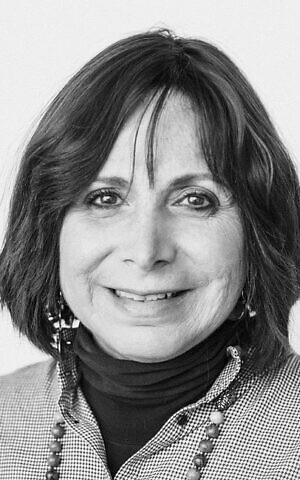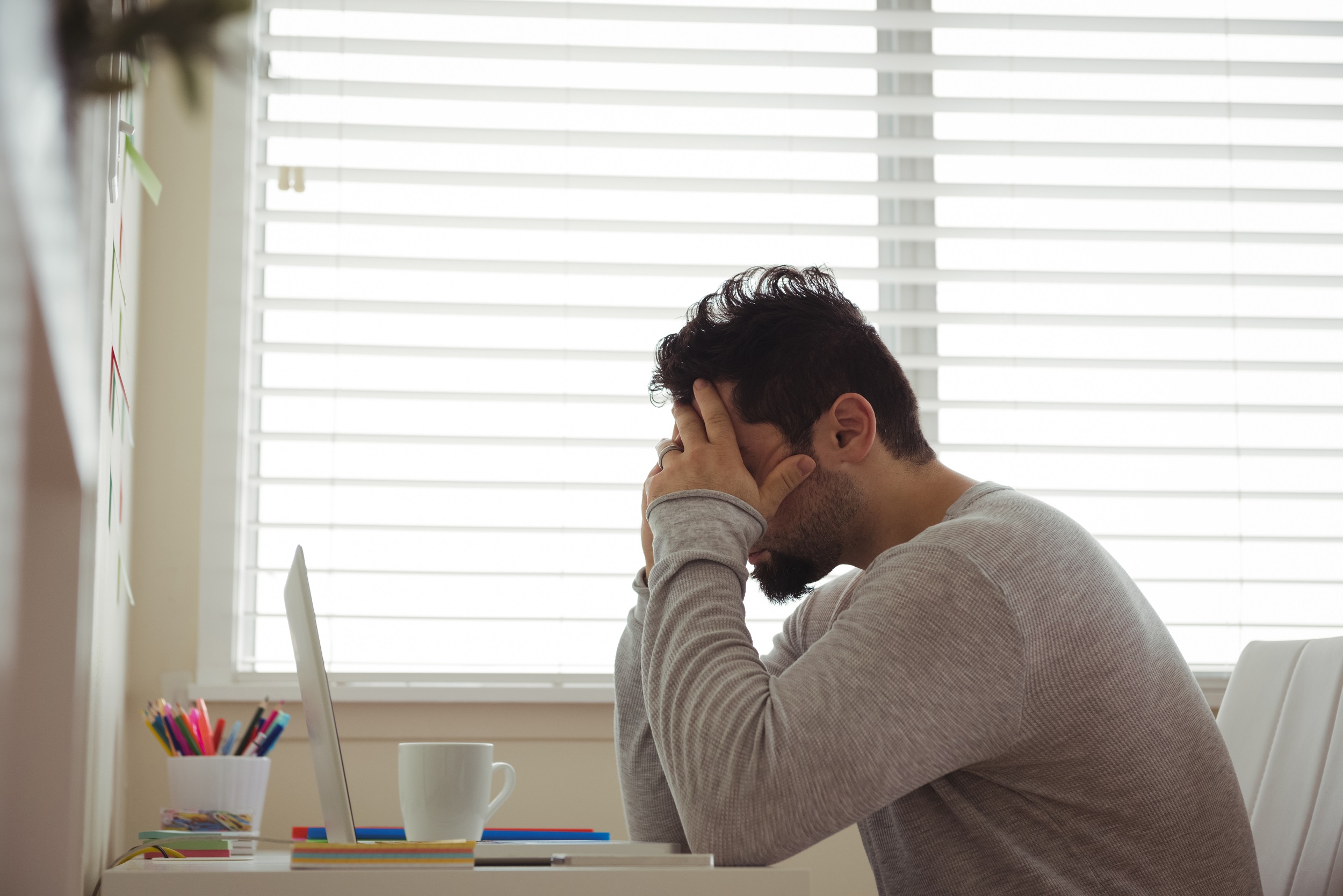Are Anxiety and Depression Getting Worse?
National studies, therapists and affected individuals paint a perplexing picture of life in the age of the pandemic.
Chana Shapiro is an educator, writer, editor and illustrator whose work has appeared in journals, newspapers and magazines. She is a regular contributor to the AJT.
The National Institutes of Health (NIH) noted a rise in anxiety diagnoses from 2020 to 2021. It describes anxiety as “intense and uncontrollable feelings that interfere with daily activities, and they often go hand in hand with depression.” The Centers for Disease Control and Prevention (CDC) claims that about one out of every ten American adults experience depression at some point in their lives, and the percentage is increasing. Depression is defined as “a sad mood that prevents normal functioning and can last for a long time. Depression can happen at any age in any type of person.”
David, an Atlanta musician, experienced years of headaches, vertigo and tinnitus (persistent ringing in the ears) until bouts of anxiety affected his work. In his late 20s, he was diagnosed with General Anxiety Disorder and tried cognitive behavioral therapy (CBT). According to the National Institute for Stress, Anxiety and Depression (NISAD), “CBT focuses on an individual’s anxiety triggers, and helps the person learn to respond to these triggers without feeling anxious.”
Eventually, David was diagnosed with oscillopsia, a chronic ocular disorder. “Finding out what was wrong and getting help with therapy and meds started me on an aggressive path to functioning again,” he says. But then COVID happened. “In 2020, COVID decreased work assignments and limited my ability to get out and stay busy. I had more anxiety and bouts of depression. With good meds and meditation based on the teachings of a Buddhist nun, Pema Chodron, I’m better, but I still worry about the future.”
In October, the peer-reviewed medical journal Nature Medicine stated, “Lockdowns, social isolation, economic stress and other consequences of the COVID-19 pandemic caused millions of additional anxiety and depression cases in 2020.” Adding to the pandemic and growing social unrest, on Nov. 10 of this year, the PBS Newshour reported widespread demonstrations addressing “climate anxiety and fear of a climate apocalypse, as either a direct or indirect result of anthropogenic climate change.” This fear would seem to increase anxiety, especially among young people.
Atlanta dentist Stanley Eisenberg reports that, since the start of the pandemic, his practice has seen a significant rise in broken teeth, TMJ and TMD (temporomanibaular joint disfunction/disorder), resulting from bruxism or teeth-grinding. An NIH survey found that “almost half the responding dentists reported an increase in bruxism, TMJ and TMD, and almost half of the patients reported more frequent migraines and/or headaches, due to psychosocial distress during the COVID-19 pandemic.”
Rose, an educator in Atlanta, on the other hand, was not adversely affected by the pandemic. “I suffer from social anxiety,” she explained, “so having fewer social situations during the pandemic has been a relief. Also, being exhausted and feeling overwhelmed contribute to and lead to my anxiety and depression, and with the slowed-down pace of pandemic life, it was easier for me to cope.
“I have not used meds. I have found that being creative helps lift my mood, and I have also turned to meditation for many years. Now, because of therapy, I have been trying to integrate the suffering parts of my life into the meditation. I started a meditation group because I find that we humans do things more strongly in groups, that we need each other for strength and inspiration.”
During 2020, Atlanta therapists were impacted by COVID-19 and issues related to it, which added to client stress.

Jewish Family & Career Services is often a bellwether of social change. Judy Spira, a clinical social worker who works for the organization’s Shalom Bayit Program and does general counseling, said that her clients cross demographic lines, ages, cultural backgrounds and “presenting problems.” Shalom Bayit offers counseling support and guidance for individuals facing physical, emotional or sexual abuse, and for those who have experienced abuse in the past.
Spira notes, “The pandemic has affected everyone greatly. My caseload has increased, and there is more stress and anxiety.” She adds that JFCS has added more staff and has responded to requests “in a comprehensive manner. JFCS has really risen to the issues and responded to the many emergent situations, as well as to the ongoing needs of the Atlanta community with a multiplicity of therapeutic modalities. JFCS has a staff of very talented, creative, caring and conscientious therapists, working in the most responsible, intelligent, compassionate and professional manner.”
Dr. Deborah Fernhoff, an Atlanta clinical psychologist, notes, “During COVID I have ‘seen’ patients throughout the country because of more lenient practice rules that allow sessions on Zoom. After the first couple of months, therapists’ volume mushroomed. We soon realized ‘shelter in place’ would be around for a long time.
“COVID served as an enzyme for what was already going on. Anxious people became more so, and it exacerbated ongoing depression, loneliness and marital strife. Extroversive personalities, who recharge their batteries by interaction with other people, suffered more than introversive people, who recharge with solitude. Early in 2020, anxieties centered around the virus and possible contamination, and some patients asked to be medicated. Some anxiety and sadness were normal responses to lack of control and how our world had changed. Meanwhile, during COVID, people received cancer diagnoses, experienced family deaths, dealt with the difficulties of arranging funerals and without the comforts of traditional shivas and visitations. Loneliness is the scourge of old age, and it is painful to be the last one standing. The conflict between the vaccinated and anti-vaxxers resulted in some families not speaking to each other,” Fernhoff continued.
“Many people had time to reflect on their life experiences and more opportunity to seek psychotherapy. I polled my patients, and the vast majority (99 percent) prefer to stay on Zoom, even if I go back to my office. The silver lining is how adaptable, flexible and inventive human beings are. Although we have lost something in not being together in one room, we are also learning to use Zoom itself as a therapeutic tool.”
Target and Walmart report increased sales of coloring books, worry beads and fidget devices and spinners — for both adults and children. The spinner became popular in April 2020, as the pandemic began to spread. Catherine Hettinger invented the device in the 1990s to soothe and entertain children who had ADHD and autism.
Scott McCoskery could never sit still at meetings, “I always had something to occupy me, like a little top or cool little knife. In the spring of 2014, during a typical conference room meeting, I wrote down ‘purpose-built device to keep hands busy, quiet, discreet, interesting, modular, mechanical, cool materials, always with you, customizable.’ Eventually, I created something that would spin and be a simple demonstration of some basic laws of rotational physics.” And the much-copied Torqbar fidget spinner was born.

In Nov. 2021, the Huffington Post reported that Britain’s red public payphone boxes were to be removed, but government telecommunications regulator Ofcom declared them to be a “lifeline” for highly anxious people. Ofcom will retain 5,000 call boxes in areas with poor mobile coverage, phone booths in areas considered accident or suicide hotspots, and any other phone boxes that have had more than 52 calls made from them in the past 12 months. Ofcom said that almost 150,000 calls to emergency government services were made from phone boxes from May 2019 to May 2020, and 45,000 calls were made to other helplines. “A public phone can be the lifeline at a time of personal stress or great need,” said director Selina Chadha.
AARP magazine notes that adults of all ages “had a decrease in physical activity because we were locked in, and there was a significant drop in mental health.” Its survey of 3,000 adults in the U.S. who became less active during lockdown reported higher levels of depression, stress and loneliness, affecting cognition, quality of sleep and anxiety. Loneliness and sedentary lifestyle severely exacerbate suffering, they report.
Recent studies at the Cleveland Health Clinic and Stanford University Clinic suggest that we tend to grow more fearful and anxious as we grow older. Studies claim that adolescents concentrate more on positive than negative experiences, but as we age, we focus more on protection (of our family, religion or country, for example), and we watch out for potential threats more than opportunities for novel experiences. So, because we are influenced by the things we choose to pay attention to, the Cleveland Health Clinic asks, “Is it a good idea to watch the news 24/7?”
- Chana Shapiro
- health & Wellness
- Local
- meditation
- Cognitive Behavior Therapy
- psychotherapy
- TMJ
- TMD
- bruxism
- Huffington Post
- Buddhist nun
- depression
- Anxiety
- General Anxiety Disorder
- COVID
- Atlanta Community
- Zoom
- Shelter in place
- Lockdowns
- social isolation
- economic stress
- COVID-19 pandemic
- social anxiety
- Ofcom
- PBS NewsHour
- fidget spinner
- pandemic
- COVID-19
- Target
- Walmart
- Stanford University Clinic
- American Association of Depression and Anxiety
- AADA
- American Association of Retired Persons
- AARP
- Center for Disease Control
- CDC
- National Institute of Health
- NIH
- National Institute for Stress
- and Depression
- NISAD
- Nature Medicine
- The Cleveland Clinic
- Jewish Family and Children’s Services
- Jewish Family & Career Services
- Shalom Bayit Program
- Torqbar Spinner
- Catherine Hettinger
- Scott McCoskery
- Dr. Deborah Fernhoff
- Judy Spira
- Dr. Stanley Eisenberg
- Pema Chadron
- Selina Chadha
- Health
- wellness




comments